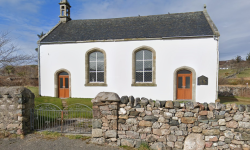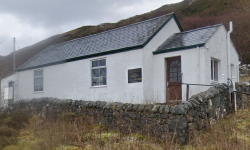FPM May 1946 Vol 51(1):16-17.
The late George Mackenzie
Achlyness, Kinlochbervie.
THE Parish of Eddrachilles, like many another parish in Scotland, has been depleted of many of whom “knowledge was taken that ,they had been with Jesus.” Within recent years three men, noted for their godliness, viz.: Donald Macleod, Duartbeg, Hector Morrison, Foindle, and George Mackenzie, Achlyness, were removed to their everlasting rest. By their removal ,the Church militant has suffered a great loss, especially the cause of truth in Eddrachilles. They were men who prayed fervently that faithful witnesses would be raised up in the congregations where they worshipped, and, it may well be, their prayers will yet be answered.
George Mackenzie was born in Tarbet in the year 1858. When only eight years old, he lost his father; who, with other three relatives, was lost at sea leaving a widow and a young family of five sons and four daughters. At the age of twenty-three he lost his two eldest brother within a period of six weeks-one was drowned at sea and the other died of virulent blood poisoning. On three occasions during a long and active seafaring life George himself narrowly escaped being drowned. Having been in charge for a considerable time of successive fishing vessels, he was well-known and respected among the fishing community from Stornoway to Aberdeen. It was at Stornoway, well over twenty years ago, that the writer met him for the first time. The impression he made. then on hearing him engage in prayer was that he was a man who received marvellous nearness to the Most High and who was endowed with remarkable gifts and talents. As the years passed the truth of that impression became more and more apparent.
George experienced many trials in temporals and spirituals and was often cast down through divers temptations. We are not able to state at what age he received the light and liberty of the Gospel but for well over thirty years he was a member and an office-bearer of the Kinlochbervie Congregation where his services were highly appreciated as a lay preacher. As a speaker at the Fellowship Meetings on Communion Fridays he showed remarkable ability, and he often related pointed anecdotes to illustrate the matter in hand. Some years ago on Friday of the Creich Communion he was speaking of the security of believers and related in connection therewith the following anecdote, viz.: A minister once visited a godly old lady who was on her death-bed. He greeted her with the words – “I fear you are sinking fast”; “ah no,” she replied, “how can one sink through a rock.”
An English tourist knowing George as a Church Office-bearer resolved to probe the Highlander’s views and opinions on religion. The conversation turned eventually on the subject of Future Punishment and ,the Englishman asked somewhat sceptically – “Can you tell me then where is Hell?” At once came George’s answer – “Yes, at the end of a godless life.” The stranger asked no more questions, but was overheard repeating reflectively as he walked away, “at the end of a godless life.”
A Gaelic poem – Cor na h-Eaglaise – which he composed and which appeared in this Magazine a few years ago, proves that George was a talented person with a rich spiritual experience. For the last two or three years of his life he resided with his brother Donald, at Tarbet, where he was well-cared for and tenderly nursed during his last illness. He had no pain, and on Sabbath evening the 8th day of July last, at the ripe old age of eighty-six years, he passed away to be for ever with the Lord. His remains were interred in the Scourie burying place there to await the morning of the resurrection and the coming of Christ upon the clouds of heaven. “The memory of the just is blessed.”


